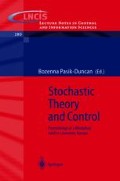Abstract
We consider simultaneous perturbation stochastic approximation (SPSA) methods applied to noise-free problems in optimization and adaptive control. More generally, we consider discrete-time fixed gain stochastic approximation processes that are defined in terms of a random field that is identically zero at some point θ*. The boundedness of the estimator process is enforced by a resetting mechanism. Under appropriate technical conditions the estimator sequence converges to θ* with geometric rate almost surely. This result is in striking contrast to classical stochastic approximation theory where the typical convergence rate is n −1/2. For the proof a discrete-time version of the ODE-method is used and the techniques of [10] are extended. A simple variant of noise free-SPSA is applied to extend a direct controller tuning method named Iterative Feedback Tuning (IFT), see [16]. Using randomization, the number of experiments required to obtain an unbiased estimate of the gradient of the cost function can be reduced significantly for multi-input multi-output systems.
Access this chapter
Tax calculation will be finalised at checkout
Purchases are for personal use only
Preview
Unable to display preview. Download preview PDF.
References
Benveniste, A., Métivier, M., and Priouret, P. (1990) Adaptive Algorithms and Stochastic Approximations. Springer-Verlag, Berlin.
Borodin, A. N. (1979) A stochastic approximation procedure in the case of weakly dependent observations, Theory of Probability and Appl. 24, 34–52.
Chen, H. F., Duncan, T. E. and Pasik-Duncan, B. (1999) A Kiefer-Wolfowitz algorithm with randomized differences, IEEE Trans. Automat. Contr. 44, 442–453.
Furstenberg, H. and Kesten, H. (1960) Products of random matrices, Ann. Math. Statist. 31, 457–469.
Gerencsér. L. (1989) On a class of mixing processes, Stochastics 26, 165–191.
Gerencsér. L. (1991) Almost sure exponential stability of random linear differential equations, Stochastics 36, 411–416.
Gerencsér. L. (1991) A representation theorem for the error of recursive estimators. Submitted to SIAM J. Control and Optimization in 1991. Revised in 1997.
Gerencsér. L. (1992) Rate of convergence of recursive estimators, SIAM J. Control and Optimization 30(5), 1200–1227.
Gerencsér. L. (1995) Rate of convergence of the LMS algorithm, Systems and Control Letters 24, 385–388.
Gerencsér. L. (1996) On fixed gain recursive estimation processes, J. of Mathematical Systems, Estimation and Control 6, 355–358. Retrieval code for full electronic manuscript: 56854.
Gerencsér. L. (1999) Rate of convergence of moments for a simultaneuous perturbation stochastic approximation method for function minimization, IEEE Trans. Automat. Contr. 44, 894–906.
Gerencsér. L. (2002) Stability of random iterative mappings. In M. Dror, P. L’ecuyer, and F. Szidarovszky, editors, Modeling Uncertainty. An Examination of its Theory, Methods, and Applications, to appear. Dordrecht, Kluwer, 2002.
Gerencsér, L., Hill, S. D., and Vágó, Zs. (1999) Optimization over discrete sets via SPSA. In Proceedings of the 38-th Conference on Decision and Control, CDC’99, 1791–1794.
Gerencsér, L. and Vágó, Zs. (2001) A stochastic approximation method for noise free optimization. In Proceedings of the European Control Conference, ECC’01, Porto, 1496–1500.
Györfi, L. and Walk, H. (1996) On the average stochastic approximation for linear regression, SIAM J. Control and Optimization 34(1), 31–61.
Hjalmarsson, H. (1999) Efficient tuning of linear multivariable controllers using iterative feedback tuning, Int. J. Adapt. Control Signal Process. 13, 553–572.
Hjalmarsson, H. (1998) Control of nonlinear systems using Iterative Feedback Tuning. In Proc. 1998 American Control Conference, Philadelphia, 2083–2087.
Hjalmarsson, H., Gevers, M., Gunnarsson, S., and Lequin, O. (1998) Iterative Feedback Tuning: theory and applications. IEEE Control Systems Magazine 18(4), 26–41.
Hjalmarsson, H., Gunnarsson, S., and Gevers, M. (1994) A convergent iterative restricted complexity control design scheme. In Proc. 33rd IEEE CDC, Orlando, Florida, 1735–1740.
Hjalmarsson, H., Gunnarsson, S., and Gevers, M. (1995) Model-free tuning of a robust regulator for a flexible transmission system. European Journal of Control 1, 148–156.
Joslin, J. A. and Heunis, A. J. (2000) Law of the iterated logarithm for a constant-gain linear stochastic gradient algorithm, SIAM J. on Control and Optimization 39, 533–570.
Kifer, Y. (1986) Ergodic Theory of Random Transformations. Birkhäuser, 1986.
Kushner, H. J. and Shwartz, A. (1984) Weak convergence and asymptotic properties of adaptive filters with constant gains, IEEE Trans. Informat. Theory 30(2), 177–182.
Kushner, H. J. and Yin, G. (1997) Stochastic Approximation Algorithms and Applications. Springer Verlag. New York.
Ljung, L. and Söderström, T. (1983) Theory and Practice of Recursive Identification. The MIT Press.
Meurers, T. and Veres, S. M. (1999) Iterative design for vibration attenuation. International Journal of Acoustics and Vibration 4(2), 79–83.
Nevelson, M. B. and Khasminskii, R. Z. (1972) Stochastic Approximation and Recursive Estimation. Nauka, Moscow (in Russian).
Solo, V. (1981) The second order properties of a time series recursion, Ann. Stat. 9, 307–317.
Spall, J. C. (1992) Multivariate stochastic approximation using a simultaneous perturbation gradient approximation, IEEE Trans. Automat. Contr. 37, 332–341.
Spall, J. C. (1997) A one-measurement form of simultaneous perturbation stochastic approximation, Automatica 33, 109–112.
Spall, J. C. (2000) Adaptive stochastic approximation by the simultaneous perturbation method, IEEE Trans. Automat. Contr. 45, 1839–1853.
Oseledec, V. I. (1968) A multiplicative ergodic theorem. Lyapunov charasteristic numbers for dynamical systems, Trans. Moscow Math. Soc. 19, 197–231.
Author information
Authors and Affiliations
Editor information
Editors and Affiliations
Additional information
Dedicated to Tyrone Duncan on occasion of his 60th birthday
Rights and permissions
Copyright information
© 2002 Springer-Verlag Berlin Heidelberg
About this paper
Cite this paper
Gerencsér, L., Vágó, Z., Hjalmarsson, H. (2002). Randomization Methods in Optimization and Adaptive Control. In: Pasik-Duncan, B. (eds) Stochastic Theory and Control. Lecture Notes in Control and Information Sciences, vol 280. Springer, Berlin, Heidelberg. https://doi.org/10.1007/3-540-48022-6_11
Download citation
DOI: https://doi.org/10.1007/3-540-48022-6_11
Published:
Publisher Name: Springer, Berlin, Heidelberg
Print ISBN: 978-3-540-43777-2
Online ISBN: 978-3-540-48022-8
eBook Packages: Springer Book Archive

